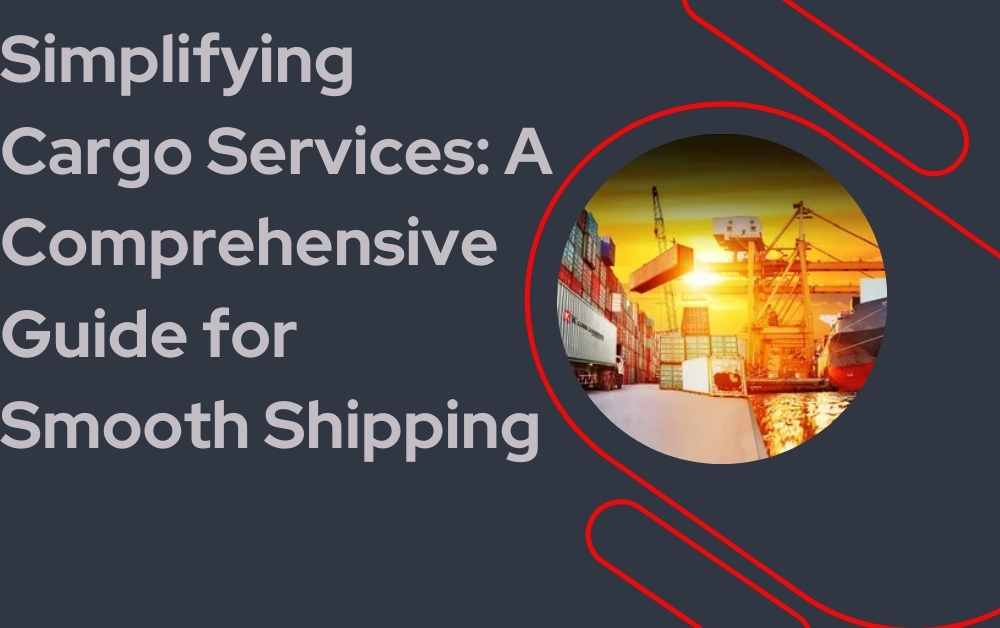In today’s globalized world, cargo services play a pivotal role in facilitating trade and commerce across borders. Whether you’re a small business owner shipping products internationally or an individual sending personal belongings overseas, understanding the ins and outs of cargo services can streamline your shipping experience. In this comprehensive guide, we’ll break down the complexities of cargo services into easily digestible bits, offering valuable insights and practical tips for a hassle-free shipping process.
Understanding Cargo Services:
What Are They?
Cargo services encompass a range of activities involved in transporting goods from one location to another. These services include freight forwarding, customs clearance, warehousing, transportation, and delivery. Essentially, cargo services ensure that goods are efficiently and safely transported from the point of origin to the final destination, whether it’s across the country or around the globe.
Types of Cargo Services:
Exploring Your Options
There are various types of cargo services tailored to different shipping needs. Air freight, sea freight, road freight, and rail freight are among the most common modes of transportation. Air freight offers speed and efficiency, ideal for time-sensitive shipments, while sea freight is cost-effective for transporting large volumes of goods over long distances. Road and rail freight are suitable for domestic shipping, providing door-to-door delivery options for businesses and individuals alike.
Key Players in the Cargo Industry:
Who Does What?
The cargo industry involves a multitude of players working together to ensure the smooth flow of goods. Freight forwarders act as intermediaries between shippers and carriers, coordinating the transportation process and handling documentation. Customs brokers assist with customs clearance procedures, ensuring compliance with import and export regulations. Carriers, including airlines, shipping lines, trucking companies, and rail operators, physically transport the goods from one location to another, while logistics providers offer end-to-end solutions, including warehousing, distribution, and inventory management.
Choosing the Right Cargo Service Provider:
Factors to Consider
When selecting a cargo service provider, several factors come into play. Consider the reliability and reputation of the provider, as well as their experience and expertise in handling your specific type of cargo. Pricing and shipping options are also essential considerations, along with the provider’s network coverage and customer support services. By thoroughly evaluating these factors, you can choose a cargo service provider that meets your shipping requirements and budget constraints.
Navigating Customs Clearance:
Simplifying the Process
Customs clearance is a crucial step in the shipping process, involving the submission of documentation and payment of duties and taxes. Understanding customs regulations and requirements is essential to avoid delays and ensure smooth clearance of your goods. Working with experienced customs brokers can simplify the process, as they have the expertise to navigate complex customs procedures and resolve any issues that may arise during clearance.
Packaging and Labeling:
Ensuring Safe Transit
Proper packaging and labeling are vital to ensuring the safe transit of your goods during shipping. Choose appropriate packaging materials that provide adequate protection against damage and ensure that packages are securely sealed to prevent tampering. Proper labeling with accurate shipping information, including addresses, tracking numbers, and handling instructions, helps facilitate efficient handling and delivery of your cargo.
Tracking and Monitoring:
Staying Informed Every Step of the Way
With advancements in technology, tracking and monitoring capabilities have become integral features of modern cargo services. Utilize tracking tools and systems offered by your cargo service provider to monitor the status and location of your shipments in real-time. This allows you to stay informed every step of the way and proactively address any issues or delays that may arise during transit.
Conclusion:
Streamlining Your Shipping Experience
In today’s globalized world, cargo services play a pivotal role in facilitating trade and commerce across borders. Whether you’re a small business owner shipping products internationally or an individual sending personal belongings overseas, understanding the ins and outs of cargo services can streamline your shipping experience. In this comprehensive guide, we’ll break down the complexities of cargo services into easily digestible bits, offering valuable insights and practical tips for a hassle-free shipping process.
Understanding Cargo Services:
What Are They?
Cargo services encompass a range of activities involved in transporting goods from one location to another. These services include freight forwarding, customs clearance, warehousing, transportation, and delivery. Essentially, cargo services ensure that goods are efficiently and safely transported from the point of origin to the final destination, whether it’s across the country or around the globe.
Types of Cargo Services:
Exploring Your Options
There are various types of cargo services tailored to different shipping needs. Air freight, sea freight, road freight, and rail freight are among the most common modes of transportation. Air freight offers speed and efficiency, ideal for time-sensitive shipments, while sea freight is cost-effective for transporting large volumes of goods over long distances. Road and rail freight are suitable for domestic shipping, providing door-to-door delivery options for businesses and individuals alike.
Key Players in the Cargo Industry:
Who Does What?
The cargo industry involves a multitude of players working together to ensure the smooth flow of goods. Freight forwarders act as intermediaries between shippers and carriers, coordinating the transportation process and handling documentation. Customs brokers assist with customs clearance procedures, ensuring compliance with import and export regulations. Carriers, including airlines, shipping lines, trucking companies, and rail operators, physically transport the goods from one location to another, while logistics providers offer end-to-end solutions, including warehousing, distribution, and inventory management.
Choosing the Right Cargo Service Provider:
Factors to Consider
When selecting a cargo service provider, several factors come into play. Consider the reliability and reputation of the provider, as well as their experience and expertise in handling your specific type of cargo. Pricing and shipping options are also essential considerations, along with the provider’s network coverage and customer support services. By thoroughly evaluating these factors, you can choose a cargo service provider that meets your shipping requirements and budget constraints.
Navigating Customs Clearance:
Simplifying the Process
Customs clearance is a crucial step in the shipping process, involving the submission of documentation and payment of duties and taxes. Understanding customs regulations and requirements is essential to avoid delays and ensure smooth clearance of your goods. Working with experienced customs brokers can simplify the process, as they have the expertise to navigate complex customs procedures and resolve any issues that may arise during clearance.
Packaging and Labeling:
Ensuring Safe Transit
Proper packaging and labeling are vital to ensuring the safe transit of your goods during shipping. Choose appropriate packaging materials that provide adequate protection against damage and ensure that packages are securely sealed to prevent tampering. Proper labeling with accurate shipping information, including addresses, tracking numbers, and handling instructions, helps facilitate efficient handling and delivery of your cargo.
Tracking and Monitoring:
Staying Informed Every Step of the Way
With advancements in technology, tracking and monitoring capabilities have become integral features of modern cargo services. Utilize tracking tools and systems offered by your cargo service provider to monitor the status and location of your shipments in real-time. This allows you to stay informed every step of the way and proactively address any issues or delays that may arise during transit.
READ ALSO : Simplifying Cargo Services: A Comprehensive Guide
Conclusion:
Streamlining Your Shipping Experience
Navigating the world of cargo services doesn’t have to be daunting. By understanding the fundamentals of cargo services, exploring your options, and partnering with the right service providers, you can streamline your shipping experience and ensure the safe and timely delivery of your goods. Whether you’re shipping products for your business or relocating to a new country, the insights and tips provided in this guide will empower you to make informed decisions and overcome any challenges that come your way in the world of cargo services.
Navigating the world of cargo services doesn’t have to be daunting. By understanding the fundamentals of cargo services, exploring your options, and partnering with the right service providers, you can streamline your shipping experience and ensure the safe and timely delivery of your goods. Whether you’re shipping products for your business or relocating to a new country, the insights and tips provided in this guide will empower you to make informed decisions and overcome any challenges that come your way in the world of cargo services.
Note :- If you need more ideas about cargo services, you can find them on this blognewscity










